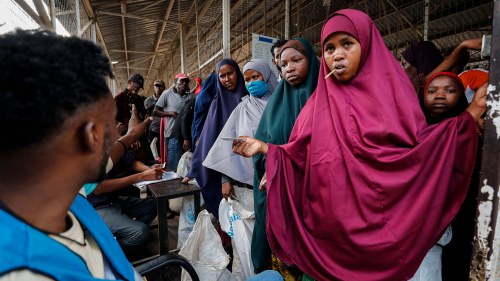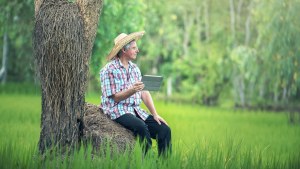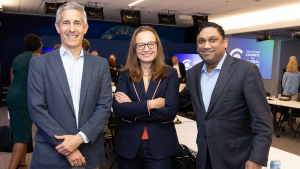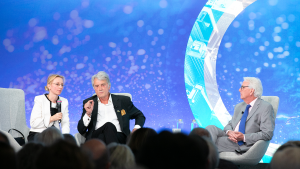Robotic Farming, Seafood Fears, and Dangerous Drought
Check out our roundup of the week's top news and research in food, agriculture, and global development.

Top Story
A Solution to the Global Food Crisis?
The combination of extreme weather conditions and geopolitical fissures is putting the world’s food security at risk. Countries like India and Argentina are responding by curbing exports, which could trigger a broader food crisis. However, experts say there is a solution: allowing free trade and using more climate-resilient crop varieties.
Council Insights
Social Media for Farms
“Digital storytelling efforts are helping to bridge the gap between rural communities and urban consumers, fostering engagement and promoting a positive image of agriculture in the digital age that could ultimately inspire a new wave of agriculturalists,” argues Natalie Burdsall in Global Food for Thought. Learn about how two farmers are using social media to advance farming by reading the full blog.
 Food and Agriculture
Food and Agriculture
Food and Agriculture
Ukrainian Grain Glut
Although global grain prices rose when the Black Sea Grain Initiative collapsed, Ukraine’s grain prices plummeted. Unable to sell their grain, Ukrainian farmers are struggling to keep their heads above water, forcing them to turn to other crops like sunflowers in the meantime.
The Politics of Farming
European countries are asking farmers to reduce livestock, relocate, or shut down to meet climate goals, and farmers are not happy about it. Feeling discarded by the political parties in power, many farmers are turning to new political movements in the hopes that their voices will be heard.
Dangerous Drought
A drought in Sri Lanka is destroying crops, threating the crisis-hit country’s summer rice harvest. Coupled with higher global oil and commodity prices, the drought could hurt near-term growth, and may force Sri Lanka to turn to large-scale, expensive imports to meet national rice demands.
Deeper Dive
Why Is Sri Lanka in Crisis?
Last year, Sri Lanka’s economy was crushed by its worst financial crisis in over 70 years, caused by a severe shortage of foreign exchange reserves. The economy has slowly stabilized after a bailout from the International Monetary Fund, but skyrocketing prices of agricultural inputs mean food prices have yet to recover.
Resilience
A New Farming Future
Cameroonian authorities are using funds from the World Bank to accelerate digital solutions to boost agricultural productivity. By extending internet access and improving the digital skills of urban and rural farmers, authorities hope to optimize harvests, reduce waste, and increase farmers’ incomes.
DC Report
Opinion: Improving SNAP Benefits
The impending reauthorization of the Farm Bill, which funds SNAP, brings up the opportunity to fully realize SNAP’s potential. By increasing benefit sizes, relaxing work requirements, and providing access for college students, SNAP could reach more people and ultimately help eliminate hunger in the United States.
Big Actors
Seafood Fears
Japan’s decision to release treated water from the Fukushima nuclear plant into the Pacific Ocean has caused significant friction with its trading partners, specifically China. China suspended all imports of Japanese seafood products, raising tensions between the two countries.
Big Ideas
Robotic Farming
A new precision agriculture robot is on the market. Designed for large-scale farming—a first for the agriculture industry—the robot helps food producers avoid waste, improve yields, and engage in more sustainable practices.
Ask an Expert
Are there ways that agriculture can have a positive effect on the environment?
“Agricultural production relies on environmental resources. Hence, agriculture impacts the environment, and it is equally impacted by environmental conditions. The key issue is whether the net impact on the environment is positive or negative, which depends on the extent to which the agricultural production system uses environmental resources. The more an agricultural system is designed to work in harmony with nature, the less it negatively impacts the environment, and the more likely it is to generate net positive environmental benefits. For example, permaculture agricultural systems, which integrate resources, land, people, and environment in mutually beneficial ways, are known to have positive environmental benefits. Agriculture is also known to provide habitat for wildlife and pollinators. Indeed, certain species such as the North American white-tailed deer are known to thrive well on open farm fields. Similarly, crops provide cover against erosion and sequester carbon dioxide from the atmosphere. However, the relevant issue is whether those benefits outweigh the negative impacts associated with establishing the crops.”
—Nonresident Fellow Kwame Yeboah


Have a question about food and agriculture? Ask one of our experts at the Center on Global Food and Agriculture to get an answer in next week's Global Food for Thought!
Council Events
Did you miss one of our previous livestreams? Don't worry! They are all available on our website to watch at any time.
Other Upcoming Events
Africa’s Food Systems Forum (AGRF) 2023 Summit
Date: September 5 – 8
Carbon, Covers, and Conservation
Date: September 7
Time: 9:00 – 11:00 a.m. CT
United Nations Day for South-South Cooperation 2023
Date: September 12
Time: 9:00 – 13:00 CET
Payments for Ecosystem Services: Win-Win Solution?
Date: September 21
Time: 7:45 – 9:15 a.m. ET
Conservation Matters: Investing in People to Improve Watersheds
Date: September 28
Time: 12:00 – 2:00 p.m. CT
Land Acknowledgement Statement
The Center on Global Food and Agriculture recognizes it occupies the ancestral land of the Kiikaapoi, Peoria, Kaskaskia, Bodwéwadmi, and Myaamia people. Indigenous communities around the world disproportionately experience the pressures of climate change, global conflicts, and the COVID-19 pandemic, while simultaneously stewarding 80 percent of the world’s biodiversity. These Indigenous tribes and nations are the original owners of this land and continue to be systemically erased by policies and practices that ignore their histories. To learn more about Indigenous foodways and practices, check out our 2022 blog series "Stewardship, Sovereignty, and Solutions."
Related Content
- Embracing Dandelions as Food and Medicine
- Going Beyond Regenerative Agriculture on Tribal Lands
- Expanding "638" to Enhance Native American Food Sovereignty
- Flavors and Culture: Food Systems Through Indigenous Women's Eyes
- A Thanksgiving Legacy: Fighting for Indigenous Food Sovereignty
- Native Food Sovereignty: Strengthening Connection to Culture
- Reconnecting to Indigenous Food Sovereignty Values and Practices
- Embracing Interconnectedness: How Indigenous Foodways Can Save Us



